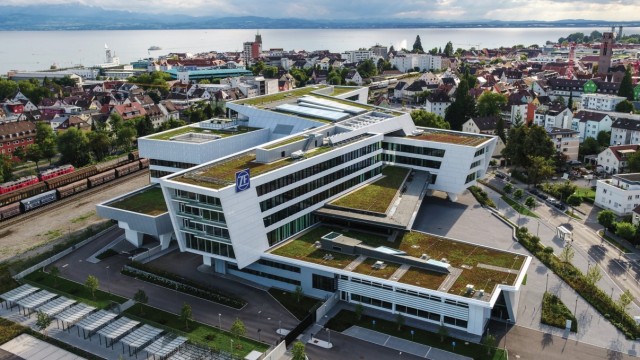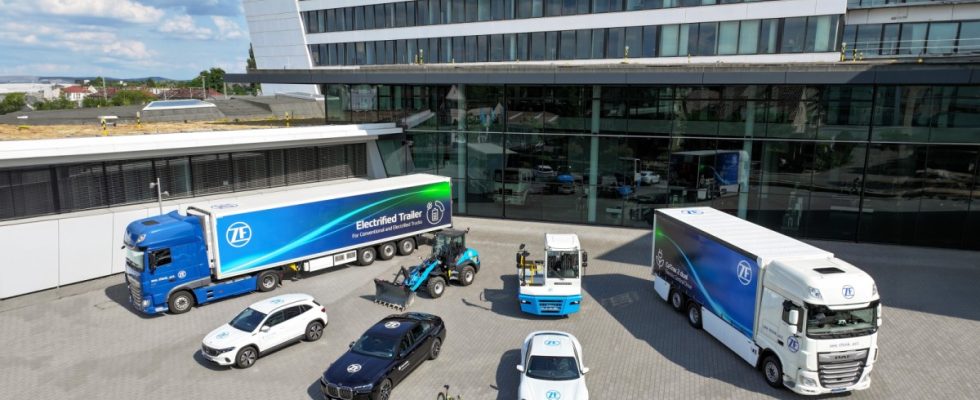There are no more cookies on Lake Constance. The employees at ZF Friedrichshafen have to look at the money and ask themselves questions like: Do we have to serve guests pastries or coffee? Should we order the new office equipment or will the old one still do? Is the business trip to the factory in the USA really necessary? Do the employees need this or that further training?
The vast majority of these questions are currently being answered with a clear no at the third largest automotive supplier in the world on Lake Constance. All employees feel the pressure to save money every day and are increasingly annoyed by having to justify every expense. Some people’s motivation suffers, we hear from the staff, others step in themselves: and pay for the hospitality out of their own pockets.
At the beginning of last year, ZF Friedrichshafen had 11.5 billion euros in debt and an annual interest burden of half a billion euros. In order to reduce liabilities more quickly, CEO Holger Klein recently imposed strict savings requirements on his workforce. Klein wants the company to save a total of six billion euros in two years. Almost one in four jobs in Germany could fall victim to austerity measures. Many employees are unsettled, we hear from the works council; they expect a concrete future plan for ZF from the board. Where should it go and how?
“Overall, this is a satisfactory result”
Even the good annual figures that the board announced digitally on Thursday (an on-site press conference with coffee and cookies was probably too expensive) do not hide the worries on Lake Constance: the supplier achieved results in all areas with its drives and technologies for cars, commercial vehicles and Industry the upper end of the target forecasts. Sales rose by 6.5 percent to 46.6 billion euros, and the return on sales rose to 5.1 percent. “Overall, this is a satisfactory result,” said ZF boss Klein at the presentation, “but that is no reason to rest on our laurels.” The boss wants to make the foundation group, whose largest shareholder is the city of Friedrichshafen, “competitive in weak markets.”
Despite a good financial year, ZF boss Holger Klein has set a strict savings target for his automotive supplier.
(Photo: Markus Altmann/ZF)
Klein, who has only been managing the business on Lake Constance for just over a year, was able to reduce debts in 2023 and push liabilities below the ten billion mark. To do this, he stopped what was once a prestigious project, the development of his own autonomous shuttles. He entered into a joint venture with Foxconn for axle production, he exited the Lidar laser scanner technology, and he is currently outsourcing the airbag business.
The current year, says Klein, will be “economically very difficult.” The car market in Europe is growing again, but is still far from pre-pandemic levels. It is similar in the USA and the Chinese market is competitive because of the local competition there. Added to this are high interest rates, expensive energy, inflation and geopolitical conflicts.
Like all suppliers, ZF is in crisis
The group also symbolizes the crisis in the supplier industry. The profit margins there have always been smaller than those of the manufacturers, who also liked to drive down prices, especially during the Corona pandemic, when far fewer cars were built. However, many suppliers are now taking revenge for either not getting involved in crucial future technologies or for being left behind by large tech companies. When it comes to autonomous driving, manufacturers are relying less and less on ZF, Continental or Bosch, but rather on new players such as Mobileye or Horizon Robotics. Some suppliers may also regret the decision not to invest in battery cell production today. The question of what role German suppliers will play in the future is entirely justified – and how many people will be needed for this.
ZF is undergoing the greatest transformation in its history. Klein is apparently unable to take his workforce with him on the path to electromobility. The words with which the boss explained the savings of six billion euros to his employees in February sounded uninspiring, more technical than visionary: “We have two years to optimize our structures and processes and thus make our organization competitive and ready for the transformation to e-mobility,” writes Klein in the communication, which is available to the SZ. The plan: ZF wants to buy materials more cheaply, avoid investments, cut costs for research and development and administration, and make the plants more productive. Revenue should also increase – in other words: ZF wants to pay its suppliers less and charge its customers more for its own products. The works council is skeptical as to whether this will work – and is alarmed.
Because what Klein doesn’t address in the announcement is the reduction in personnel. ZF will close its factory in Gelsenkirchen at the end of the year and the Eitorf location at the end of 2027. In six years, the company could have cut 12,000 of the 56,000 jobs in Germany; the board presented this figure to the employee representatives, with the note: This is how many employees leave voluntarily, without ending up on the street, through retirement, partial retirement, and termination agreements . Where ZF previously needed two employees to assemble combustion transmissions, it now apparently only needs one for the electric motor. ZF retrains employees, but not to the same extent as VW. The company says that not every transmission fitter becomes a good electronics technician or brake technology specialist.
After all: The employee representatives see it as recognition that the 50,000 collective bargaining employees in Germany will receive a sales share of 1,000 euros for 2023, despite all the austerity constraints. Compared to what Mercedes and Porsche pay out, the bonus is a joke.
ZF produces many new technologies abroad
Overall, the works council believes that the board is not doing enough to keep employees at the German locations. ZF says it wants to continue to locate high-tech technologies in this country and only send mass production abroad, where you pay less for labor and energy and don’t have to fill out as many forms. We learn from works council circles that innovative electric axles for large German car manufacturers are actually first produced in this country. However, only in small quantities in order to gain experience. We hear that the axles would later be manufactured in Pančevo, Serbia. This is where the actual value creation takes place.
Not everything is going smoothly at other suppliers either: Bosch is cutting 7,000 jobs, Continental has to save 400 million euros and cut 1,750 jobs. The fact that ZF has to save so much more is due to two expensive acquisitions: Nine years ago, ZF swallowed the American group TRW for 12.4 billion euros, but largely reduced its liabilities by 2019 and also thanks to TRW’s sales of disc brakes and electric steering systems and seat belts refinanced.
Inspired by this, ZF took over the commercial vehicle specialist Wabco from the USA in May 2020 for around seven billion euros, also in order to make itself less dependent on the passenger car business and to establish itself in the higher-margin truck market. It was a difficult time to buy big: the corona pandemic had just begun and demand for vehicles of all sizes had collapsed. With the acquisitions of TRW and Wabco, ZF has expanded into a giant corporation that today employs around 169,000 people worldwide. There are some employees who believe that ZF should not have taken over the two companies.

For its 100th anniversary, the group donated the ZF Forum in Friedrichshafen, which has been home to the board of directors and a museum since 2016. However, the fat years are over.
(Photo: Felix Kaestle/ZF)
So is ZF’s recent history one of overestimation of itself? Boss Klein, who is not responsible for the acquisitions, sees it differently. “The acquisitions were valuable and made us the largest supplier of commercial vehicles.” Of course, he would like to reduce the debt faster than is currently possible. That’s why the “strict cost regime” is needed.
With the six billion savings, ZF wants to secure its investment program of 18 billion euros for the next three years. The group wants to spend up to 30 percent in this country, provided the costs fall. Investments in electromobility, chassis and computers should form the backbone. ZF is industrializing its electrical orders, bundling its chassis systems, building a new factory for energy-saving chips in Saarland, and ZF is upgrading its transmission factory in South Carolina for almost half a billion euros. And the former transmission and chassis specialist is building a new business area for on-board computers, which will replace the dozens of control units in vehicles in the future – not just in cars, but also in trucks, combine harvesters and buses.
In order to be able to afford all of this, you first have to save money at ZF. The employees suffer from this and would like more guidance from the board around Klein. He’s currently thinking about a new strategy and nothing is ready to be decided yet. But his employees shouldn’t have to spend every cent forever. Nobody knows yet when there will be cookies again on Lake Constance.

